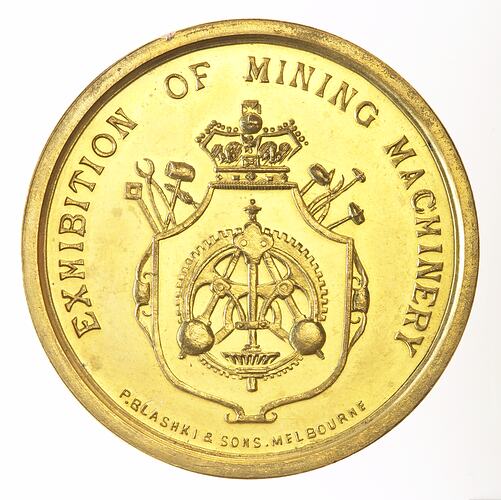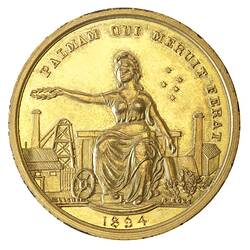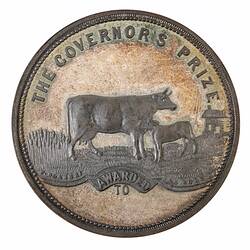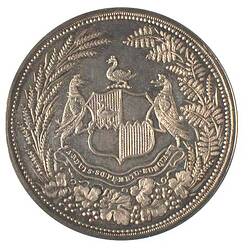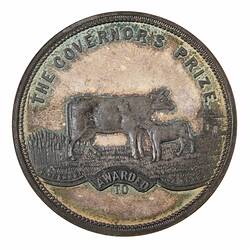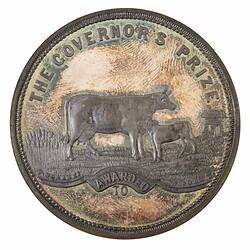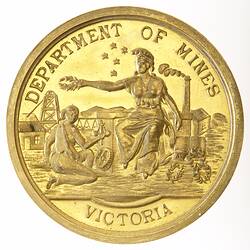The firm P. Blashki & Sons traces its origins to 1858, the year of founder Phillip Blashki's arrival in Victoria. The family business still operates in the 21st century, making regalia including academic gowns, judges' wigs, chains of office, medals, badges, epaulettes and swords.
Phillip Blashki was born Favel Wagczewski in Blaszki, Poland, on 21 February 1837. He left home at 18 and travelled to Manchester, then one of the great commercial and industrial centres in England. He was employed as a tassel-maker. On 1 December 1857 he married a young widow with one child, Hannah Potash. They migrated to Australia, arriving in 1858.
Blashki began his working life in Australia as a hawker; he was soon also using his skills as a silversmith. Hannah gave birth to the first Jewish twins in Australia, and another son two years later. Eventually they would have 18 children, 15 of whom survived. Blashki soon saw an opportunity for business as a result of the gold rush, and began to trade in gold.
The family moved to Geelong - perhaps because it was located between the goldfields and a sea port - and by the age of 30 Blashki had his wife and nine children to support. His business was also growing, he had two addresses and was considered 'respectable' in the community. However his fortunes took a dramatic turn in 1866, when he was robbed of a suitcase containing 700 pounds worth of jewellery, which he was carrying for trading gold. The police did not investigate the case thoroughly, although the thief was opening living on the profits of the theft. Blashki found temporary employment in an attempt to pay off the loss, but was soon declared bankrupt. The thief was later arrested for another crime and confessed to robbing Blashki; eventually some of the jewellery was recovered. Blashki continued to work hard to pay off the loss, and then moved his family back to Melbourne to start afresh. By 1868 he was supporting 11 children. Son Hyman, aged 18, drowned tragically in 1873, trying to rescue passengers from a sinking boat.
Around 1875 Blashki decided to open a business in Melbourne as a city trader. He had strong regional connections which helped the business. His jewellery shop in Bourke Street included six rooms in which his large family lived. The business prospered, except for two 'stormy' periods. His sons Aaron, Lou and Henry assisted Phillip in the business, which grew until 1893, when the depression hit. Blashki's sons persuaded him to retire, and they took over the company. The following year the company won a tender to design and manufacture a shield to be donated by Lord Sheffield as a perpetual trophy for the state cricket competition. The company also made a ceremonial chain that is held in the Museum Victoria collection (89 1255). It was worn by Grand Secretary and consisted of 25 jewels and the Grand United Order shield. In 1899 P. Blashki & Sons struck the "Governor's Medal" (NU 34512 etc), they also struck medals for the Exhibition of Mining Machinery (c.1894 - NU 20360 etc).
Phillip Blashki's other achievements included co-founding the Melbourne Jewish Aid Association and the Jewish Herald Association. He also had a long and distinguished Masonic career, was a JP and an honorary magistrate, actively promoted and facilitated Jewish education in Melbourne, and was instrumental in founding the Victorian Chamber of Manufactures. He was also an observant Jew. When he died in 1916 the Herald carried a front page article and photograph.
P. Blashki & Sons continued during the 20th century. In 1978 it acquired the regalia firm Harvey C. Smith Pty Ltd. The business passed into the ownership of Blashki's grandson, Ivon Sage, and continues today under the ownership of the Masters family.
References:
Hammer, Gael R. (circa 1986). 'Phillip Blashki; A Victoria Patriach'.
P. Blashki & Sons web site http://www.blashki.com.au.
Blashki web site Manufacturer and Supplier of Ceremonial Regalia - About Us (blashki.com.au), accessed 14 Oct 2022.
More Information
-
Keywords
-
Localities
-
Authors
-
Article types
